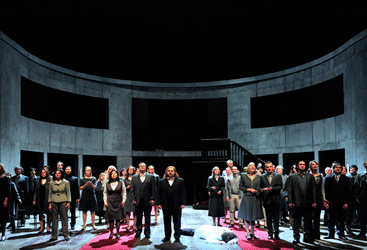Tannhäuser (Norwich)

© MAURICE KORBEL
Tannhäuser in Eva-Maria Høckmayr's production under the baton of Fabrice Bollon is an amalgam of the two Dresden versions and the Paris one. It makes musical sense certainly, though the staging requires the audience to pay considerable attention.
The set design by Nina von Essen and many of the costumes by Julia Roesler are variations on a grey theme. Venus (Viktoria Mester) wears flame-red, Elisabeth (Dana Bursová) alternates between black and white and Tannhäuser himself (Marius Vlad at the performance I saw) blends sacrd and profane with purples.
Where it gets complicated is in the use of doppelgängers for these three principals characters – I suppose that, this being basically a modern-dress production, you might also call them avatars. So Elisabeth contains in herself elements of Venus – maiden, madonna and whore, as does Venus.
Both the orchestra and chorus sweep us along in their combined tsunami of sound with some fine solo singing riding on the waves. The shepherd boy soloist from the boys choir of Calw makes a particular impact as Tannhäuser descends from the mount of Venus (as Julia Liebermann's surtitles have it) to be greeted by his fellow knights.
Vlad makes much of his exchanges with his former comrades; here Alejandro Lárraga Schleske's Wolfram stands out. He is equally lyrical for the song contest in Act Two and in "Ah du mein holder Abendstern", though usual this Act Three show-stopper has him all-but seduced by Venus. Vlad's "Inbrunst im Herzen" which follows it is very fine.
Vocally and histrionically both the women are extremely good. Bursová sounds radiant in "Wie jetzt mein Busen" and heartbreaking in "Allmächt'ge Jungfrau", truly a soul drained of hope. Authoritative in scarlet, Jin Seok Lee's Landgraf is in equally commanding voice.
The two tenors – Roberto Gionfriddo as Walther, Shinsuke Nishioka as Heinrich – and the basses Ks Neal Schwantes as Biterolf and Andrei Yvan as Reinmar provide well-contrasted studies in hidebound masculine superiority. The pilgrims' choruses swell unambiguously to climax the second and third act and to herald the audience's appreciation.










